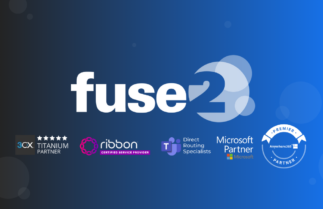What is a VoIP Phone system?
VoIP phone systems are a hardware or software-based system designed to work over an internet connection. VoIP (Voice over Internet Protocol) is a technology that uses an internet connection to process (make and receive) calls rather than relying on traditional landlines.
They are the preferred technology for modern communications due to their cost-effectiveness, scalability and enhanced feature set. Phone service providers embrace VoIP to deliver telephone services to customers, eliminating the need for installing and maintaining physical phone lines and equipment. VoIP not only facilitates high-quality calls but also introduces advanced features typically unavailable with traditional landline services.
Pros
- Cost Effective
- Scalable
- Global Flexibility
- Enhanced Feature Sets
- Increased Accessibility
Cons
- Requires a stable internet connection
- Usually requires re-training for staff members / users
- Could require new hardware (If you’d prefer to stick to hardware over software)

Benefits of VoIP Phone Systems
Embracing VoIP technology opens doors to a host of benefits, ranging from substantial cost savings to superior call quality and an array of advanced features.
Flexible Working
By eliminating the need for traditional physical lines, VoIP allows you and your staff / colleagues to work from anywhere in the world, at anytime! Phone calls are no longer tied down to physical locations and with a VoIP phone system you can still display your chosen countries IP address no matter where you are in the world.
As long as you have an internet connection, you will be able to make and receive phone calls. This therefore reduces the need for using personal phone minutes for work purposes. All of these benefits have been huge unique selling points for VoIP since COVID as we are now seeing more people working remotely!
Cheaper alternative to traditional phone line
VoIP is a considerably more cost effective solution when compared to traditional phone lines, simply due to the costing of hardware. VoIP requires a lot less hardware and maintenance due to it’s virtual presence rather than physical presence.
All VoIP systems are configured and managed off-site and in the cloud – so in most cases if your system needs fixing, it will be done by your provider in an instance with no need for in-person engineer visits. As calls are made over existing infrastructure (internet connection) there’s no need for expensive hardware or costly installation fee’s.
improve efficiency and productivity
VoIP offers many benefits however, the ones that stand out the most are the number of additional phone systems features and functionality which can be implemented at little, to sometimes, no cost. Functionality such as Call Recording, Agent Scoring and Wall Boards encourage for more productive and driven staff, as all calls can be replayed and reviewed.
This proves to be very beneficial to many businesses as staffs performance can be easily assessed and monitored, which can give staff that extra little kick to provide the best service possible
Better call quality
As VoIP calls are carried over the internet, the quality of calls significantly increases (as long as you have a strong internet connection!). VoIP works by delivering voice packets over internet lines however, these are different to our average internet lines which we receive all our social media from.
These lines prioritise voice packets and deliver them via dedicated paths providing a secure environment for the call details. This ensures the communication process is as seamless and crystal-clear as possible, all while being secure!
Reliability and disaster recovery
One of the key benefiting factors of VoIP is that there are many precautions in place to eliminate potential outages and system failures. For example, at Fuse 2 each of our data centres have a secondary failover site in the unlikely event of a natural disaster or full complete outage. Services can be seamlessly migrated to the failover site meaning no disruptions to any communications for the end user.
The method of having failover sites is common for many service providers, therefore ensuring full reliability and recovery of services in the event of an outage. This benefits many businesses as the migration to the failover site is seamless and will occur without the end user even noticing!
Scalability
A VoIP phone system is one of the simplest means of communication to scale. When compared to scaling a traditional phone line, increasing or decreasing your limits and users is extremely simple. This only requires a call to your service provider and they should be able to implement these changes quickly (if not the same day!) with no in-person disruptions.
This also applies for increasing things such as feature set. If you wish to enhance your phone system features and address missing functionality this can easily be implemented by your service provider.
Prepared for the ISDN Switch Off
With the ISDN switch-off fast approaching, now is the time to consider your next steps. In short, the ISDN being switched off means that all traditional phone lines will be removed by 2025. For businesses this could lead to some serious implications if not addressed early to avoid any potential outages.
VoIP is one of the few alternatives for the PSTN and is the most beneficial in terms of costing and reliability. Investing in a VoIP system today can not only save a significant amount in maintenance, support and installation but also guarantees a future-proof solution guaranteed to support your comms for years to come!
Easy Integration with other business systems
VoIP is one of the simplest solutions to integrate with other business systems. With integration to many, if not most, modern CRMs and other applications such as WhatsApp, Facebook and SMS – VoIP is one of the most scalable and adaptable solutions on the market.
This means you can easily merge your calendars and customer information from CRM systems to allow for more seamless customer experiences. Consolidating your applications and business systems is hugely beneficial in any company and can provide significant return on investment in the long run.
Why switch to VoIP phone systems?
In short, if you wish to remain ahead of the curve with your business communications – VoIP is the way to go! VoIP provides amplified call quality, state-of-the-art feature sets and enhanced customer experience all while saving you and your business a significant amount of money in the long run. Switching to VoIP will also ensure you and your business are prepared for the 2025 ISDN/PSTN switch-off, allowing you to stay ahead of the curve!
Businesses excelling with VoIP Systems
Most modern businesses have already made the switch to VoIP including some huge names such as Coca Cola, BMW, NHS and many, many more. All of these companies rely on fast, clear and reliable communications which is why VoIP is the best solution for them. Many businesses have seen significant savings by using VoIP systems and enhanced customer experience, therefore generating revenue while saving money – a win win! Across the world, over 33% of all businesses are now using VoIP and this is estimated to reach 88% by 2025.
are VoIP phones more sustainable?
VoIP hardware is much more sustainable for the planet when compared to traditional phone lines. Traditional lines are made from copper wires which are installed throughout the world – the installation and maintenance of copper lines can significantly impact the environment during the production and disposal stages. Whereas, VoIP systems are carried over internet lines that require no installation or physical maintenance therefore reducing the impact on the environment.






